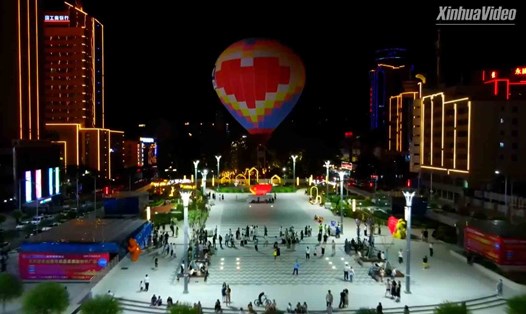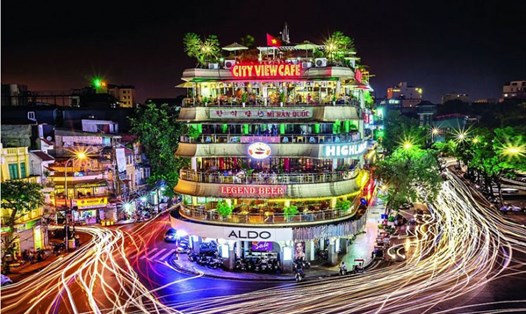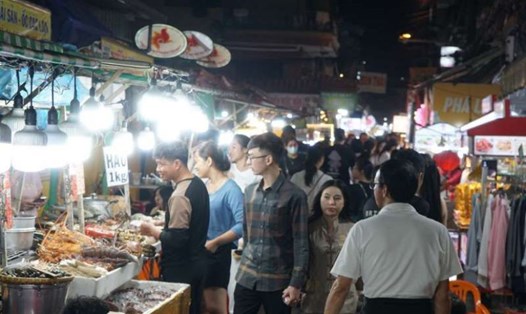From Asian night markets to European nightclubs
For centuries, night markets have been a beloved fixture and part of city life across Asia, drawing crowds of locals and tourists alike, and for some, even creating memorable experiences. Under the bright lights of the streets, you might get your first taste of ice cream, get lost in the crowd, or even catch a glimpse of your future spouse.
From Calcutta, India, to Singapore, Surabaya, Indonesia, to Manila, the Philippines, night markets are a popular feature of local life. Hong Kong, China, is no exception, with its many tourist attractions lining its harbor. One travel book from the early 1930s described the bustling street markets of Kowloon, advising that “the adventure is much more enjoyable if one ventures out at night, when the streets are brilliantly lit and the electric lights from the shops combine to create a scene of beautiful interplay of light.”
Climatic conditions contribute to the favorable conditions for nocturnal activities. In the hot tropics, the evenings - usually after an afternoon shower - are clearer and cooler. At this time, people will go out for a walk to enjoy the fresh air, chat with friends, relatives, neighbors, and conveniently buy a few things along the way. To serve the commercial activities, the shops on the main streets are always open, and when night falls, some turn into pedestrian streets with small stalls next to each other that only open to serve night customers, commonly food stalls. Street performances such as music, juggling or acrobatics are quite bustling with the audience being paid only a few coins.
Night markets are likened to a “nightclub” for ordinary people, where they can freely go to have fun and entertain themselves without worrying about being charged a fee. In Bangkok (Thailand) or Kuala Lumpur (Malaysia) and other cities in the Asian region, night markets are popular with tourists because they want to experience like a real local.
In Europe, when darkness covers most towns and big cities, shops close, people return home to rest after a long day of work, many lights are still on, and many other lights are just starting to turn on because the "night economy" is now operating. The cities of Berlin (Germany), Rotterdam (Netherlands), Manchester (UK) or Barcelona (Spain) ... are all among the cities with the best nightlife in the world in 2024 voted by Time Out Magazine. That is the right time to relax with music at nightclubs, bars, music events, bustling parties on the beach ...
“A thriving night-time economy is more than just bars and music venues lining the streets,” says Shain Shapiro, founder and CEO of global consultancy Sound Diplomacy. “It has to be managed, planned and strategized to accommodate both those who want to relax and those who want to go out and have fun.”
And a night-time economy, he says, is about creating cities for all ages, cultures, faiths and genders.
Night-time economy - importance and challenges
Manolis Psarros, CEO and chief strategy officer at UK marketing firm TOPOSOPHY, said that after emerging from the pandemic, many cities are focusing more on the role of the night-time economy in their efforts to foster a dynamic 24-hour society. The term “night-time economy” refers to a diverse range of activities that take place in city centres, typically between 6pm and 6am. These activities can include retail, culture, entertainment, transport and hospitality, as well as associated services such as security and supply chain.
In the UK, for example, the night-time economy is expected to fall from 5.1% of GDP in 2019 to 4.1% in 2022 due to COVID-19, with a corresponding drop in turnover from £116.1 billion to £93.7 billion, but the night-time workforce still accounts for a significant proportion of total employment. In fact, in the UK, 1 in 9 workers are employed in the night-time economy, according to a 2023 report from the British Night-Time Industries Association.
On the other hand, the night-time economy not only brings financial revenue to urban areas, the value it brings is much more than that! According to experts, in addition to the undeniable impact of making consumers spend more, night-time activities have a significant cultural contribution, especially in creative fields including: Music, cultural events and supporting fields such as late-night public transport and food and beverage (F&B). Other social benefits can be easily seen such as helping people relax after a long day of work and the fact that shops and services are open longer can help reduce daytime congestion in urban spaces.
Importantly, vibrant night-time economic activities contribute to the attractiveness of tourist cities. About 80 cities around the world have recognized the importance of the night-time economy, accordingly, they have established night-time management committees and appointed leaders, playing the role of "night mayors" to strengthen management, support and optimize efficiency, especially after the difficulties of the COVID-19 pandemic.
Looking at major cities like New York, London and Sydney shows just how significant the impact of the night-time economy is. New York City’s night-time economy generates $35.1 billion annually and supports more than 300,000 jobs. In London, the night-time economy accounts for 723,000 jobs, with pre-COVID-19 projections of an additional 66,000 jobs by 2026; and in Sydney, the potential for growth is projected to increase by 60% to $43 billion AUD ($27.6 billion USD) with appropriate support.
On the other hand, city authorities are aware that vibrant nightlife can also bring environmental and community challenges. The environmental impact of increased traffic and activity at night, as well as the presence of bars and nightclubs near residential areas, also raises concerns such as air and light pollution, disorderly behaviour and littering.
Not to mention the security issues, crime rates, violent behavior and alcohol-related hospitalisations, all of which put additional pressure on the police and emergency services. While crime may increase with more activity in the evenings and nights, it is fair to say that a vibrant nightlife sometimes contributes to a sense of safety in the community compared to dark, quiet and deserted streets, experts say.









